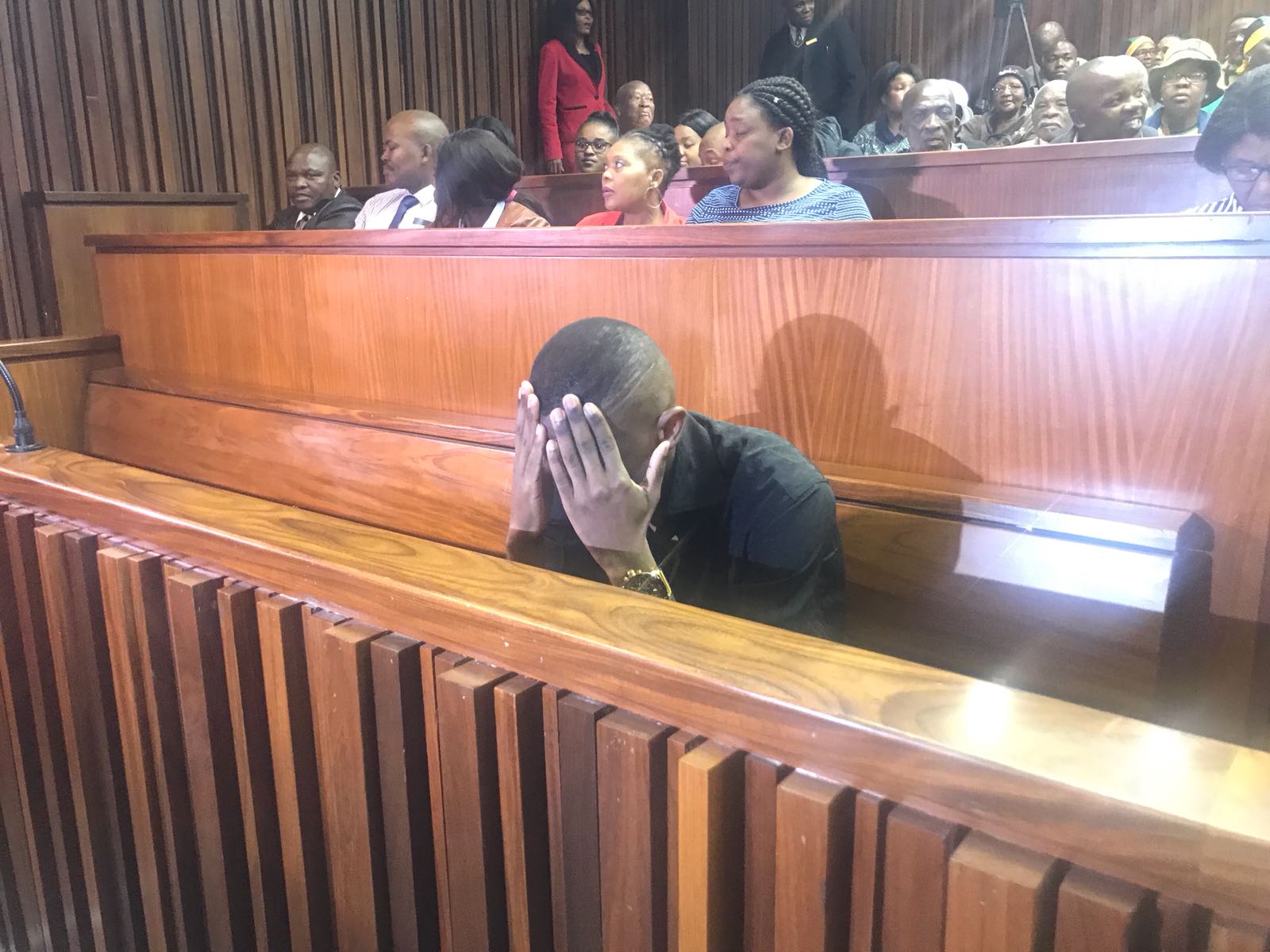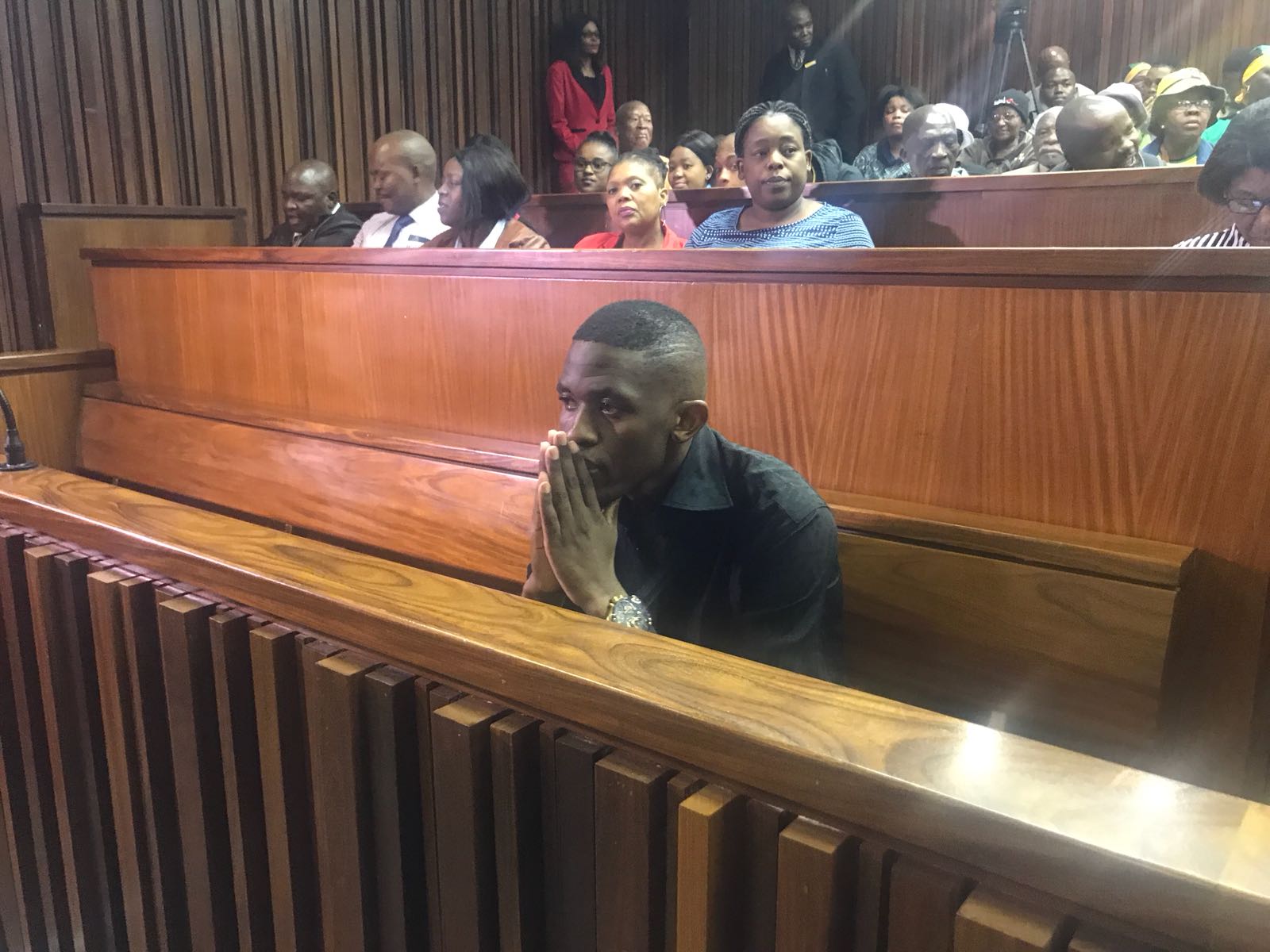On Monday
Sandile Mantsoe was sentenced on Thursday to a total of 32 years in prison for the murder of his former girlfriend, Karabo Mokoena.
The sentence includes five years for assault, 30 years for murder and four years for defeating the ends of justice.
On March 27 2017 Mantsoe assaulted his former girlfriend, Karabo Mokoena and just over a month later, in the early hours of April 28, Mantsoe killed Mokoena.
READ MORE: Mantsoe apologises for burning, not murdering Mokoena
The judge said it was unclear how Mantsoe killed her, but state witnesses testified they believe she was stabbed in the neck with a knife. Mantsoe then transported Mokoena’s body to Corlett Drive in Lyndhurst where he dumped and burned her corpse with petrol, acid and a tyre.
After Mantsoe stepped down from the stand where he was testifying in mitigation of sentence, defence Victor Simelane called Pastor Otis Nyandoro.
The pastor, a senior lecturer at the University of the Witwatersrand, has known Mantsoe for 10 years and sees him as a Good Samaritan, who did charitable acts for the church and the community.
“One thing I admire about him is his passion and energy,” Nyandoro said.
Although Nyandoro knew the accused as a charitable person he agreed with the court’s ruling saying, “What he has been convicted of is a terrible crime and because he’s been convicted of it, he’s guilty.”
Nyandoro then stepped down from the witness box to make way for Nonhlanhla Dlamini, the mother of Mantsoe’s daughter. Mantsoe has three children, two are with his former wife and one is with Dlamini.
Dlamini described how she and Mantsoe met in church and his treatment of her during their relationship. “He was inspiring and helped me to build my character towards my aspirations. He’s a very good man. He’s always been someone I can rely on and very loyal as well.”
She also detailed how he was as a father describing Mantsoe as being present in his daughter’s life, being a great co-parent and “family man”.
When the state advocate asked Dlamini why the two had separated, she stated Mantsoe had wanted to embark on a relationship with Mokoena.
She then went on to say how she is upset that he is in prison because now she has to be a “single parent.”
“The whole situation is very complex especially emotionally. As a mother to a child I can sympathise with Karabo’s family but at the same time my daughter will be deprived of her father,” Dlamini said.
After Dlamini stepped down, the state called Lolo Mokoena, Karabo’s mother, to testify in aggravation of sentence about the aftermath of Karabo’s death and how it has affected her and her and the family.
“The death of Karabo has been a shock to me and my whole body because I never thought Karabo would pass on.” Lolo said.
She recalled how she felt after learning about her daughter’s death. She was sitting in the Sandton police station when an officer cleared out the room. “That’s when I started to get pains in my stomach and I realised that I was going to hear something that I didn’t want to hear,” Lolo remembers, taking off her glasses, tears streaming down her face.
“I just screamed when she told me. I don’t even know who heard me but I just screamed.”
As Lolo recalled her pain, Mantsoe hung his head, placing his hands on his face.

“Karabo’s passing is something that is very hurtful to me. It’s like someone has stepped on your feet. It’s like opening a hole in your heart.”
After describing how she felt, she mentioned how when she first met Mantsoe he did not make eye contact. She then stated that as the relationship continued, Karabo would send her photo messages of injuries that Mantsoe caused her. Lolo said she once told Karabo about reporting the incidents and taking Mantsoe to court, but Karabo would just say that “she loves him.”
At the end of her testimony, Lolo mentioned that Karabo had “life plans.”
After Lolo gave her testimony, both the prosecution and defence gave final remarks.
Defence Victor Simelane told the court that the accused can “make a great contribution to society” and that he shouldn’t face a sentence of life imprisonment. He argued that the court should take the lifestyle relationship between the accused and the deceased into the account when deciding on a sentence.
Acting Judge Peet Johnson then asked, “What does lifestyle have to do with killing someone?”
The defence then said they don’t know exactly what happened in Mokoena’s final hours, to which the judge replied, “But the accused knows,” which elicited loud cheers from her family.
The defence then said, “A lot of individuals can actually block an unsavoury memory in their minds,” and then stepped down.
State advocate Pakanyiswa Marasela then asked the court for a sentence of life imprisonment, “He’s not going to repent because he does not show remorse. He was trying every trick in the book to not be associated with this matter but unfortunately he was caught up. He is showing sympathy for himself but no remorse,” she said.
After hearing both lawyers, Judge Johnson adjourned to “evaluate and consider both matters.”
The sentence
When Judge Johnson returned, he began to give his sentence. He said that three factors are taken into account when deciding on a sentence. These include “the interest of society, the interest of the accused and the offences that the accused has committed.”
He began to weigh each offence, which included assault with the intent to cause grievous bodily harm, murder and defeating the ends of justice. In Mantsoe’s testimony he said that he was remorseful, but not for murdering Mokoena. Judge Johnson started by saying, “The court cannot come to any other conclusion other than this remorse is self-pity. You are more concerned that you have been caught”.
“The court got the impression that you were claiming to be the victim without any regard to the deceased. You have had no regard for the deceased, the family or the friends of the deceased.”
Judge Johnson then talked about the assault charges. He said that assault was “a serious offence” and the fact that Mantsoe had paid for her hospital bill did not “minimise violations.”
“Your actions cannot be described in any nicer terms. We are constantly being reminded that violence against woman has no place in this country,” said Judge Johnson, “Despite these warnings these offences are prevalent in the area. Despite harsher sentences the offences are on the increase…”
He then addressed Mokoena’s murder. Judge Johnson said, “This court would like to describe it as a crime of no return. The deceased had a constitutional right to life. And you had no right to deposess her of her life.”
He continued, “A person’s life is the most important asset that a person has. If a person loses his life, he has nothing. In this case the deceased has nothing, thanks to you. You have taken her life from her and have nonchalantly carried on with your life as if nothing was wrong.”
The judge continued to denounce Mantsoe saying to him that “the court cannot describe you in any other way than a devil in disguise.”
He found that his “coldheartedness” towards the deceased and her family was unforgivable. “You knew full well where her body was but you kept everyone guessing and feeding them lies,” said Johnson.
Finally, the judge addressed the last offence — defeating the ends of justice — stating Mantsoe’s own lawyer had admitted he had committed this crime.
After addressing each offence, the judge spoke about the impact that Mantsoe’s murder had on Mokoena’s family and about gender-based violence and its consequences.
“In sentencing you the intention is to serve as a warning to others that this type of conduct, abuse towards women, will not be tolerated in society… She died for the rights of abused woman. Abused women have to be protected against abuse from men like you. It would be appropriate to call you a person that gives men a bad name.”
Judge Johnson continued, “You deserve nothing less than a harsh punishment. Taking life comes with a high price and now you will have to pay a high price. You will now be an outcast in the community.”
Judge Johnson then announced the sentence, which included 30 years for murder, five years for assault and four years for defeating the ends of justice.
The family was relieved after the judge gave his sentence, but felt that Mantsoe did not get a long enough sentence for his crimes.
“We would have wished for more years, but i think no amount of years can bring the life of Karabo back. I think my job is done as the uncle and as the spokesperson of the family,” said Mokoena’s uncle.
Stephanie Leong, one of Mokoena’s friends who testified, said that she didn’t care about how long Mantsoe would be sentenced for, but she was disappointed that he never admitted to the crimes, “What I was hoping for was that he would have some sort of humanity and compassion inside of himself where he would actually tell the truth because the worst thing is not actually knowing what happened to Karabo and the only person who knows is Sandile and unfortunately Sandile won’t man up and speak the truth.”

After Mantsoe attempted an apology in court, Mokoena’s father said that he cannot accept an apology from Mantsoe, “This time the devil will always be a liar. Accepting the apology today is going to be very, very difficult. I cannot promise today or ever. To bury a daughter I understand, but a burnt body of the daughter? I couldn’t even see her.”
Leong reaffirmed those feelings, saying, “His apology has no reverence because he’s full of lies.”
State lawyer, Mike Hlatshwayo believes the sentence was just and will serve the courts in the future. “I think it will have the deterrence that we always try to send out there to future criminals to say the courts aren’t going to take easy to people committing criminal offences, especially abuse against women,” he said.
Defence lawyer Victor Simelane began says he has begun to “discuss the issue of appealing” right after Mantsoe was found guilty. They hope to appeal to a higher court on the basis of the record and “body of evidence,” but not on the judgment.
Now that the case is closed, Thabang Mokoena’s father has a powerful message for men who commit gender violence, “All the men out there who abuse women — wait until you have a daughter. Wait until your daughter is abused. It’s going to be very, very, very painful. The accused has got a daughter. How is he going to feel when his daughter is abused? We don’t accept women abuse in totality.”